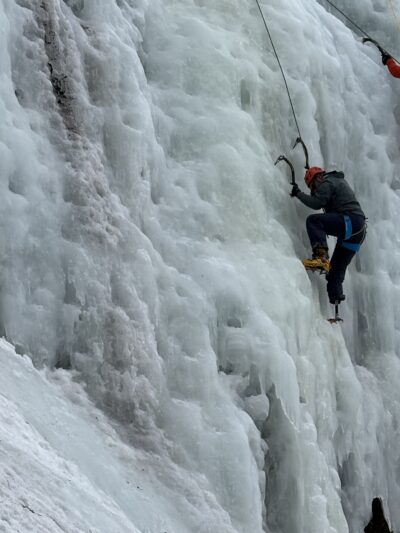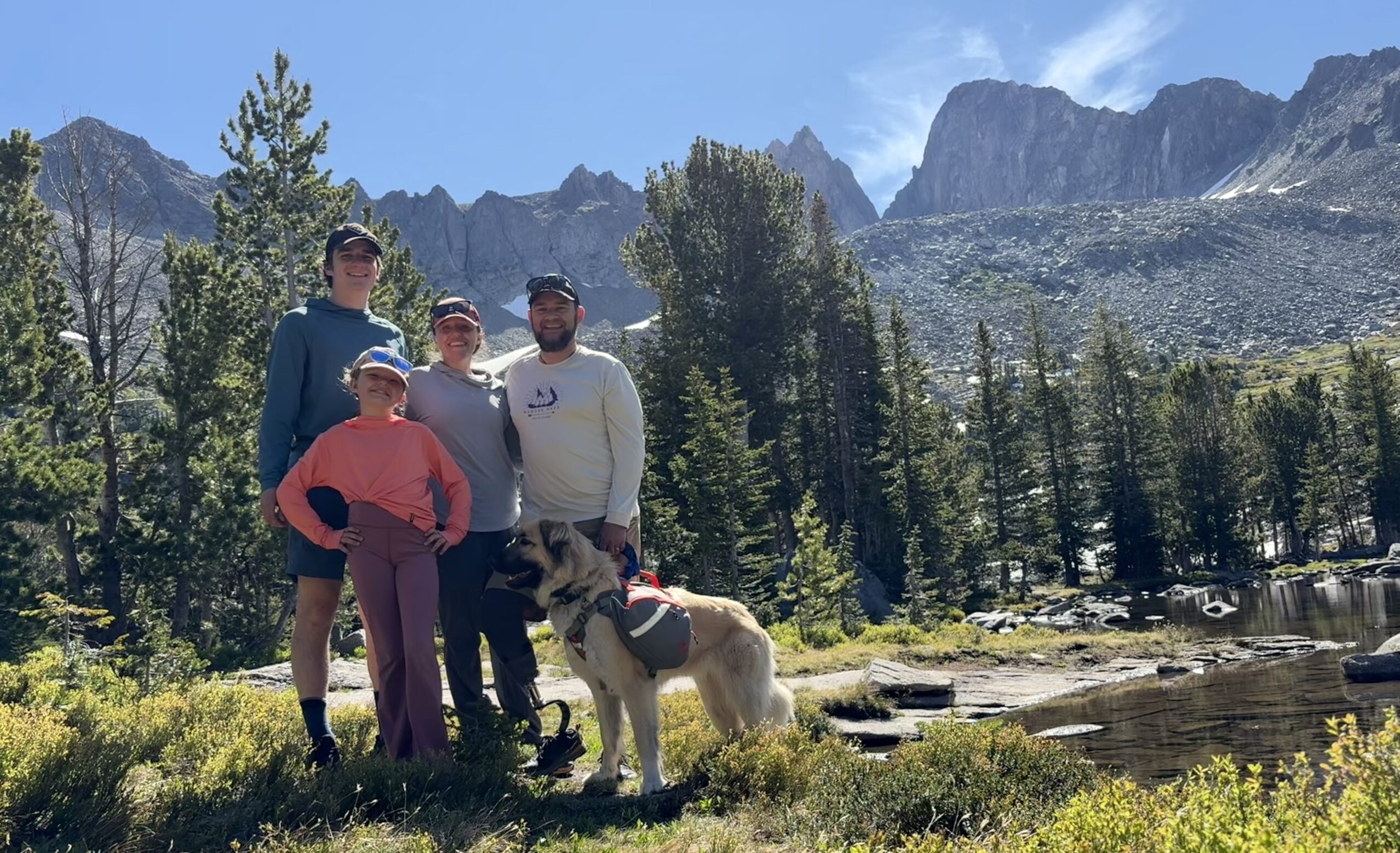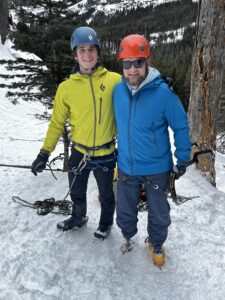by Andrea Bailey Willits
On a warm summer night in Colorado, the Rev. Canon Aaron Buttery runs down the street alongside his 10-year-old daughter, Grace. The slap of her sneakers on the pavement blends with the click of his prosthetic running foot as they circle the neighborhood. Father and daughter became running partners as Aaron learned to run with the new curved carbon blade that replaces his right foot.
It has been exactly a year since Aaron’s leg was amputated six inches below the knee. The pastor, coach and C4SO’s Canon for Culture and Values is now healed enough to run with Grace and resume his favorite activities of skiing, mountain climbing and backpacking. He continues to serve as the Associate Rector at International Anglican Church in Colorado Springs and holds leadership roles in both C4SO and the Anglican Church in North America.
But to reach this point, Aaron walked through unimaginable suffering.
The Accident
The choice to amputate came after decades of pain and longing for more mobility. Aaron, an avid outdoorsman, was involved in a tragic accident in March 2006. Along with his wife Jennifer, and their 11-month-old son Isaac, he was driving four hours home from a trip. Jennifer sat in the backseat beside their baby.
In a no-fault accident, a large truck pulling a trailer loaded with heavy equipment struck the driver’s side of their car. Jennifer died at the scene. Miraculously, Isaac was unharmed. Aaron suffered traumatic brain injury, the loss of vision in his right eye, and severe injuries to both shoulders and legs. His right ankle was crushed.
Aaron spent nearly two weeks in the hospital, undergoing multiple surgeries to address his injuries while at the same time trying to come to grips with the loss of his wife. Many dear friends came to sit with him and support him. One friend wept quietly in his room. When he asked why, she told him, “Because you can’t cry right now. So I’m crying for you.”
In those moments, Aaron sensed God’s presence. “The Father cared for me and provided healing in the most devastating circumstances,” he says.
Most of Aaron’s injuries healed within a year, even his right eye—thanks to a convent of nuns in Alabama who prayed specifically for restored vision.
But his ankle did not heal.
Over the next four years, Aaron underwent 10 surgeries on his ankle before choosing to have it surgically fused. That worked for a decade, until the surrounding joints began to deteriorate. By 2023, walking from the living room to the kitchen—which he did often because he loved to cook —sometimes required crawling. Even with the support of his son Isaac, his wife Lyndee whom he married in 2012, and their daughter Grace, the pain was debilitating.
Aaron and his doctors considered every option. Which path might bring less pain and more mobility?
The answer, they finally determined, was amputation.
The Preparation
As soon as Aaron announced his decision, his community rallied around him. Aaron launched a GoFundMe, “From Amputation to Adventure,” to help cover the cost of his surgery and prosthetics. The generosity of friends and family quickly helped him surpass his goal.
For his surgery, Aaron chose the Limb Restoration Program, where his care team included surgeons, nurses, a prosthetist, a social worker and a nerve specialist. Everyone collaborated to ensure the best possible outcome.
Notwithstanding an excellent team, Aaron had two primary terrors he expressed to God. The first was then-9-year-old Grace. How would she process seeing her father lose a limb?
The second terror was waking up from surgery, looking down, and breaking under the weight of seeing only one foot where there had previously been two.
The Surgery
On August 19, 2024, doctors successfully performed Aaron’s surgery. Afterward, he was wheeled into the recovery room. The doctors turned off the pain medication to do a routine nerve test, but something went wrong. They could not restart the pain medication. What was supposed to be a split-second of pain became 20 minutes of sheer agony.
“The pain was beyond overwhelming, but it also meant that I had no chance to look down and see my missing foot,” Aaron says.
While many people wouldn’t see that as an answered prayer, Aaron’s attitude was what everyone who knows him would expect—grateful. He cheerfully recalls how later that night, Lyndee smuggled pesto into the hospital so they could enjoy “Pesto Night,” a special tradition from when they were dating.
“God was with me,” Aaron says, “present in my suffering.”
The Recovery
Back home, Aaron and his family began an extensive healing process to arrive at his new normal. A few weeks later, Aaron was moving through the house on crutches. As he passed Grace reading on the couch, she looked up and said, “Dad, how’s your leg?”
“Oh, baby girl, you know, it hurts,” Aaron replied. “It’s okay. It’s recovering.”
She said, “No, your other leg.”
Her answer made him laugh, but Aaron knows it’s an answered prayer for Grace to have adjusted so well to “the weird stump where a foot’s supposed to be.” She hasn’t once been afraid of it, alleviating his fear of a traumatic impact on her mind and heart.
It took several more months to heal enough to be fitted for a prosthetic leg. Now, Aaron has three. His everyday leg lets him hike and play Frisbee. His running blade is designed for speed and lightness. His ice-climbing leg ends in spikes for gripping frozen surfaces. Within the first year, Aaron skied, ice climbed, scaled mountains and went backpacking in Montana.
 His son Isaac, 20, shares Aaron’s love for adventure. Isaac helped design Aaron’s ice-climbing leg and is now collaborating with companies like Beartooth Alpine to design prosthetics for other adaptive athletes.
His son Isaac, 20, shares Aaron’s love for adventure. Isaac helped design Aaron’s ice-climbing leg and is now collaborating with companies like Beartooth Alpine to design prosthetics for other adaptive athletes.
“Both my kids and Lyndee have just been wildly kind. The Holy Spirit has allowed them to engage with kindness, care and imagination,” Aaron says.
In another answered prayer, Aaron hasn’t experienced any phantom limb pain, a common side effect of amputation. He asked his community to pray specifically for that, and God granted his request.
But Aaron readily admits he’s spent many days in horrible pain. He decided not to ask himself every day whether amputation had been the “right” choice.
“That’s just a prison of constant evaluation,” he says.
Instead, Aaron gave himself permission to enter the day however he was feeling, to be sustained through it, to learn from it, good or bad.
“Every time I’m sitting, standing and walking, I’m thinking and learning,” Aaron says. “I’ve always loved learning and bringing an adaptive mindset to challenges. I think it’s part of how I was made to interact with the world. I hope [my amputation] allows me to continue to do that with more empathy, compassion and thoughtfulness.”
Never Alone
Every step of the journey, Aaron has experienced God not as a distant observer but as one who comes close. For anyone who is in pain—especially chronic pain—he urges you to find others who will remind you you’re not alone, and look for how God might be with you in it.
Amputation, while significant, is not the biggest part of Aaron’s story.
“There are many things more important than the fact that I had my leg cut off,” he says.
One of those things is family. As Aaron’s evening run with Grace ends, the two slow to a walk. His blade clicks softly on the pavement beside her sneakers. Aaron whispers a thank-you to the Holy Spirit for caring for Grace so well.
“The Lord is with us. He shares our suffering,” Aaron says. “Even in the midst of it, he is inviting us into the fullness of life.”
The Rev. Canon Aaron Buttery is deeply committed to the raising of generations of spiritual leaders and followers of Jesus. He is particularly focused and passionate about the relationships and systems that empower people to follow Jesus and lead others to him. Aaron currently leads as Associate Rector of International Anglican Church, Colorado Springs, Colorado, Next Generation Leadership for C4SO, and Provincial Canon for the Next Generation Leadership Initiative.




